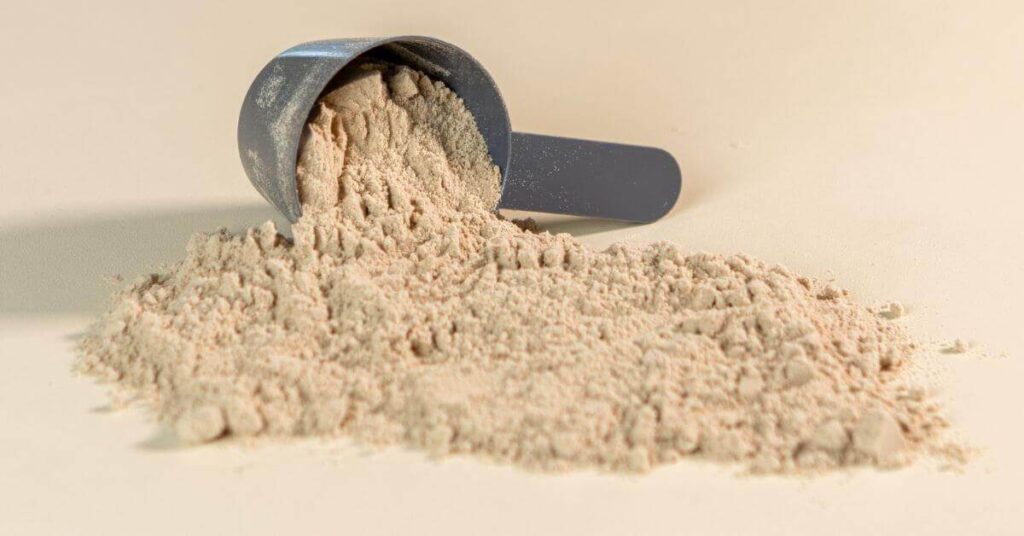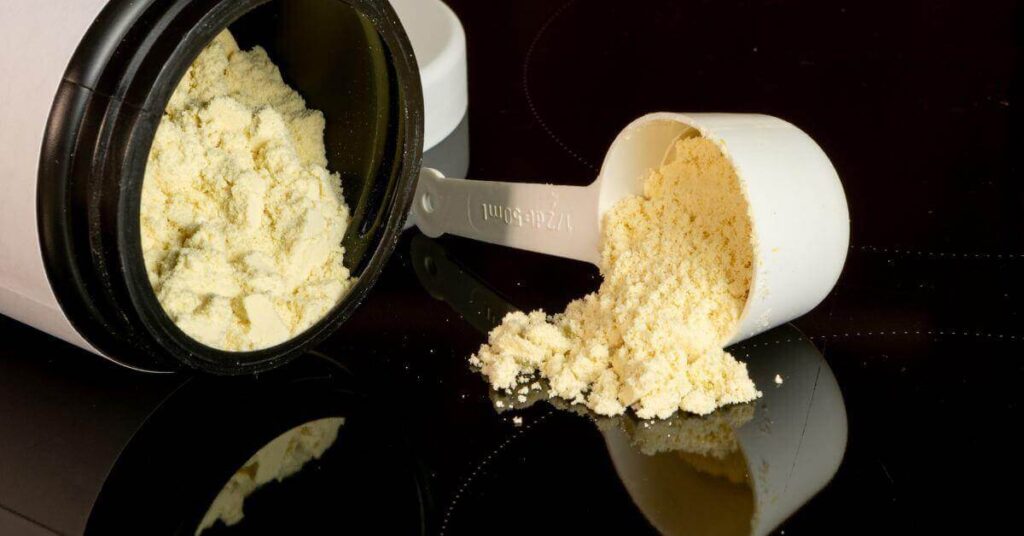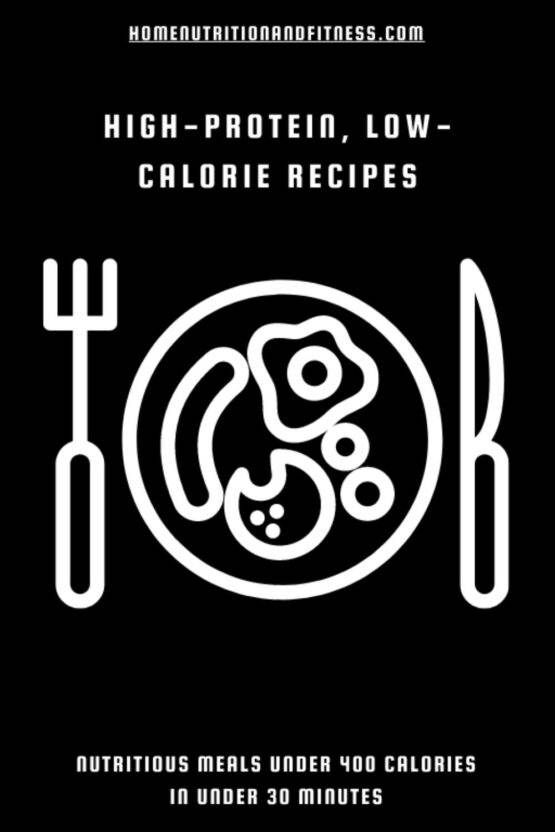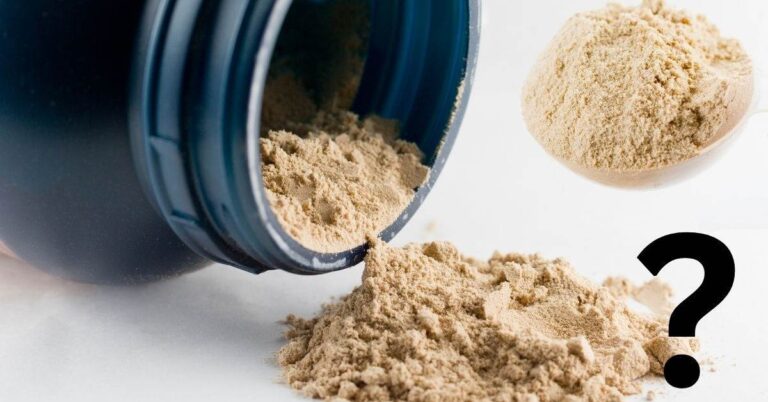Ever wondered whether you can get all of your protein from protein powder supplements? Theoretically, yes you can. But should you?
Protein is essential for building and repairing muscles, and it’s also important for a healthy immune system and other bodily functions. While protein powder supplements can be a convenient way to get more protein into your diet, they may not be the best or only source of protein you need.
Protein is an essential nutrient that plays a vital role in maintaining optimal health. While it is possible to get all the protein you need from food sources, protein powder supplements can be a convenient way to supplement your protein intake. It is important to choose a high-quality protein powder and read the labels carefully to ensure that it meets your nutritional needs. In simple terms, yes you can consume your entire recommended protein intake from supplements alone. However, you run a real risk of becoming deficient in other key macro and micronutrients. Protein powders are a supplement meant to complement your diet, not replace it.
What Is Protein?

Understanding what protein does is key to determining how much and what kind of protein you need. Protein is made up of amino acids, which are the building blocks of muscle tissue. There are 20 different amino acids, and your body needs all of them to function properly. Some amino acids can be produced by your body, while others must be obtained through your diet. These are called essential amino acids, and they are found in animal products such as meat, fish, eggs, and dairy, as well as in some plant-based sources such as soy, quinoa, and hemp seeds.
Protein can be found in a variety of foods, including meat, fish, eggs, dairy products, nuts, seeds, and legumes. The amount of protein needed varies depending on factors such as age, gender, weight, and activity level.
While it is possible to get all the protein you need from food sources, protein powder supplements can be a convenient way to supplement your protein intake. Protein powders are made from various sources, including whey, casein, soy, pea, and hemp. They come in different forms, including concentrates, isolates, and hydrolysates.
It is important to note that not all protein powders are created equal. Some may contain added sugars, artificial flavours, and other additives. It is essential to read the labels carefully and choose a high-quality protein powder that meets your nutritional needs.
Role of Protein Powder Supplements
Protein powder supplements are a convenient and popular way to increase protein intake. They are typically made from whey, casein, soy, or pea protein and come in various forms such as powders, bars, and ready-to-drink shakes.
Protein powders can be used to supplement a healthy diet, especially for people who struggle to meet their daily protein requirements through food alone. They are particularly useful for athletes and bodybuilders who require higher protein intake to support muscle growth and repair.

Protein powder supplements are also beneficial for vegetarians and vegans who may struggle to get enough protein from plant-based sources. However, it is important to choose a protein powder supplement that is suitable for your dietary needs and preferences.
It is worth noting that protein powders should not be relied on as the sole source of protein in a diet. Whole foods such as meat, fish, eggs, dairy, legumes, and nuts also provide essential nutrients that are not present in protein powders.
The role of protein powder supplements in your diet is important to consider. While protein powder supplements can be a convenient and easy way to get more protein into your diet, they probably should not be relied on as the sole source of protein. Eating a variety of whole foods that contain protein is important for getting all of the essential amino acids your body needs.
How Much Protein Can You Digest At Once?
There is a common belief that the body can only digest 30 grams of protein at once. However, this is not entirely accurate. Studies have shown that the body can digest a larger amount of protein, but it may take longer to do so.
The rate of protein digestion varies depending on the source of protein and other factors such as age and health status. The oro-ileal digestibility, which is a measure of overall protein usage, tends to be around 91-95% depending on the source and assumes a reasonable acute dose (10-50g at once), with animal sources having a slightly higher absorption rate than plant sources.
The rate of protein uptake on an hourly basis can fluctuate between 5-10g per hour, depending on the source. This means that consuming a large amount of protein at once may not be as efficient as consuming smaller amounts throughout the day.
However, the body has the ability to self-regulate the time that amino acids stay in the intestines. The digestive hormone CCK, which is released when dietary protein is present, can slow down intestinal contractions and speed up the absorption process. This hormone also regulates appetite and satiety in response to food.
Overall, there isn’t a single number that is the answer to how much protein can be digested at once. The body tends to preserve all amino acids, and how effective it is at doing so varies from person to person. Studies have shown that consuming more than 54g of protein in a single meal versus across four meals resulted in no differences in women with an average of 90 lb of lean mass.
While it is possible to digest more than 30 grams of protein at once, it may be more efficient to consume smaller amounts throughout the day. The body has the ability to self-regulate the digestion of amino acids and tends to preserve all amino acids for use later.
Related Posts:
Can You Get All Your Protein From Protein Powder Supplements?
Recommended Daily Protein Intake
The recommended daily protein intake varies depending on factors such as age, sex, weight, and activity level. As a general guideline, the British Nutrition Foundation recommends that adults consume at least 0.75 grams of protein per kilogram of body weight per day.
However, for athletes, bodybuilders and more active individuals, the recommended intake is higher at 1.2-1.7 grams of protein per kilogram of body weight per day.
For example, a sedentary woman who weighs 60 kilograms would need at least 45 grams of protein per day, while a moderately active man who weighs 80 kilograms would need at least 60 grams of protein per day. For an active male weighing 80kg, the recommended protein intake is between 96g and 136g.
Benefits of Protein Powder Supplements
Protein powder supplements are a convenient and efficient way to increase your protein intake. They can be easily mixed into water, milk, or other beverages, making it easy to consume on-the-go or after a workout. Protein powder supplements are also a great option for vegetarians and vegans who may have a harder time getting enough protein from their diet.
Potential Risks and Limitations
While protein powder supplements can be beneficial, there are also potential risks and limitations to consider. One of the main concerns is the quality of protein in the powder. Some lower quality protein powders may contain harmful additives or contaminants, so it is important to choose a reputable brand. Additionally, relying solely on protein powder supplements may limit your intake of other important nutrients, such as vitamins, minerals, and fibre.
Another potential risk of relying solely on protein powder supplements is the risk of nutrient deficiency. A diet that is too high in protein can lead to a deficiency in other important nutrients, such as carbohydrates and fats. This can lead to a variety of health issues, including fatigue, weakness, and digestive problems.
Protein Powder Supplements Can Lead to Nutrient Deficiency
If you are considering relying solely on protein powder supplements for your protein needs, it is important to be aware of the potential risk of nutrient deficiency. While protein is an important nutrient, it is not the only nutrient your body needs to function properly. A diet that is too high in protein can lead to a deficiency in other important nutrients, such as carbohydrates and fats. This can lead to a variety of health issues, including fatigue, weakness, and digestive problems.
Potential problems you may encounter:
- Limited Nutrient Profile: Protein powders, while rich in protein, lack the comprehensive nutrient profile found in whole foods. They often lack essential vitamins, minerals, fibre, and healthy fats that are crucial for overall health.
- Overlooking Carbohydrates and Fats: A diet overly reliant on protein powder may lead to neglecting other macronutrients like carbohydrates and fats, which play vital roles in energy production, brain function, and nutrient absorption.
- Incomplete Amino Acid Profile: Protein powders may not offer the full spectrum of amino acids that whole protein sources, like meat and dairy, provide. This can impact the synthesis of various proteins in the body.
- Fibre Deficiency: Most protein powders are devoid of fibre, which is essential for digestive health and maintaining a feeling of fullness.
- Micro- and Macronutrient Imbalance: An imbalanced diet focused solely on protein powders can disrupt the body’s ability to maintain proper nutrient ratios, potentially leading to nutrient deficiencies and health issues.
By relying exclusively on protein powder supplements, individuals risk missing out on these vital nutrients, which are abundantly available in a well-rounded whole-food diet.
Balancing Protein Sources

As with any nutrient, it’s important to have a balanced diet that includes a variety of protein sources. While protein powder supplements can be a convenient way to increase your protein intake, they should not be relied on as the sole source of protein in your diet.
Combining Protein Powder and Whole-Food Sources
Combining protein powder with natural sources of protein can help you meet your daily protein needs while also providing a variety of other nutrients. For example, you could mix protein powder with kefir for a high-protein snack that also provides calcium and vitamin D.
Other natural sources of protein include meat, fish, eggs, dairy products, beans, peas, lentils, nuts, and seeds. Including a variety of these foods in your diet can help ensure that you’re getting all of the essential amino acids your body needs and reducing the risk of malnutrition.
Conclusion
Protein powder supplements can be a convenient and effective way to increase protein intake, especially for those who struggle to meet their protein needs through whole foods alone. However, it is important to remember that protein powders should not be relied upon as the sole source of protein in a diet. A balanced diet that includes a variety of whole foods is essential for overall health and well-being.
Additionally, it is important to remember that protein needs vary between individuals and depend on factors such as age, gender, and activity level. Consulting with a healthcare professional or registered dietitian can help determine individual protein needs and ensure that protein intake is adequate.
Overall, incorporating protein powder supplements into a balanced diet can be a beneficial way to increase protein intake and support overall health and fitness goals. However, it should be done in conjunction with a variety of whole foods and with careful consideration of individual protein needs and the quality of the protein powder chosen.
Frequently Asked Questions
What are the best protein powders for meeting your daily protein requirements?
The best protein powders for meeting your daily protein requirements are those that contain a complete amino acid profile and are easily digestible. Whey protein powder is a popular choice as it is quickly absorbed by the body and contains all nine essential amino acids. Casein protein powder is another option, which is slower to digest and provides a sustained release of amino acids to the body. Plant-based protein powders, such as pea protein and soy protein, are also good options for those who follow a vegan or vegetarian diet.
How much protein powder should I consume in a day to aid weight loss?
The amount of protein powder you should consume in a day to aid weight loss depends on your body weight and activity level. As a general rule, aim to consume 0.8-1 gram of protein per pound of body weight per day. For example, if you weigh 150 pounds, you should aim to consume between 120-150 grams of protein per day. However, it is important to note that protein powder should not be used as a meal replacement and should be consumed as part of a balanced diet.
Is it possible to meet all your protein requirements solely through protein powder supplements?
While it is possible to meet all your protein requirements solely through protein powder supplements, it is not recommended. Whole foods provide a variety of essential nutrients that are not found in protein powder supplements. It is important to consume a balanced diet that includes a variety of protein sources, such as lean meats, fish, eggs, and legumes.
Can consuming protein powder supplements lead to liver damage?
Consuming protein powder supplements in moderation is not known to cause liver damage. However, consuming excessive amounts of protein powder supplements can put a strain on the liver and kidneys, especially if you have pre-existing liver or kidney conditions. It is important to consume protein powder supplements in moderation and as part of a balanced diet.
Will drinking protein shakes make me gain weight?
Drinking protein shakes alone will not make you gain weight. Weight gain occurs when you consume more calories than your body burns. If you consume protein shakes as part of a balanced diet and within your daily calorie needs, they can aid in weight loss and muscle gain.







